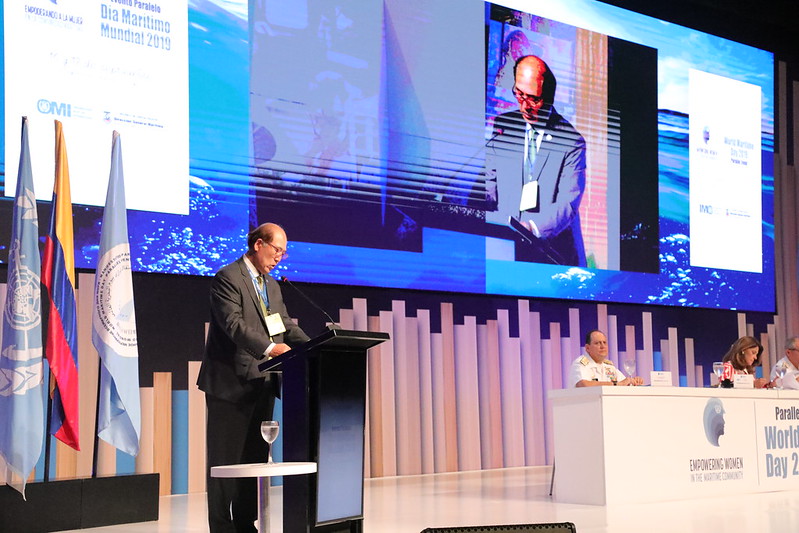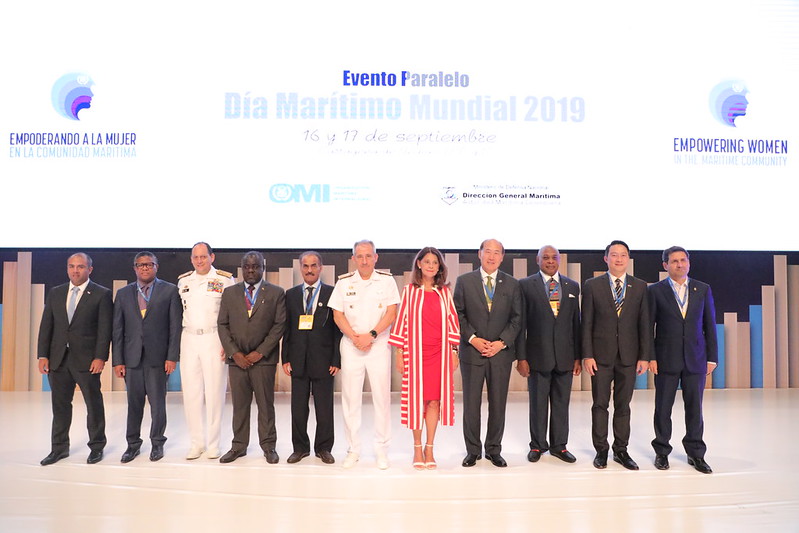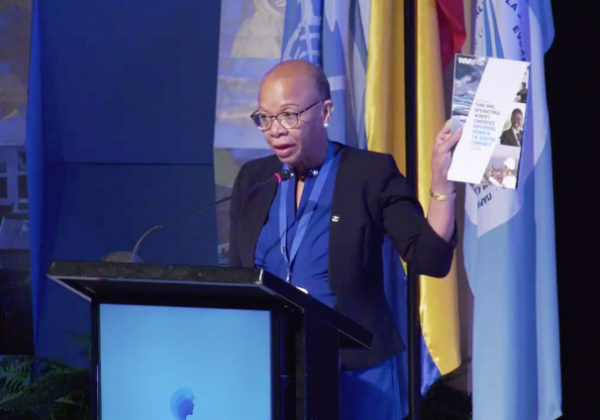COLOMBIA: World Maritime Day Parallel Event in Cartagena
This year’s World Maritime Day (WMD) parallel event was held in Cartagena, Colombia, from September 15 to 17, on the theme of Empowering women in the maritime community of 2019. The theme provides the opportunity to raise awareness on the importance of gender equality, in line with the United Nations Sustainable Development Goals
“Maritime transport must attract talent from all corners of the world and from all sectors of the population to ensure its own sustainability.” These were the words pronounced by the IMO Secretary General during his inaugural speech at the Parallel Event of World Maritime Day 2019 in Cartagena (Colombia).
“Improving women’s participation in society will lead us to better social and economic results. This is also true in the maritime community. Therefore, it is essential that women have equal access to opportunities at all levels and within from all sectors of the maritime industry Experience shows that when these opportunities are given, women take advantage of them with great success, continually challenging outdated perceptions and demonstrating that, today, the maritime sector is for everyone. it’s about your gender, it’s about what you can do, “said the Secretary General.
The motto of the 2019 World Maritime Day: “Empowering women in the maritime sector” was reflected in the various high-level events. The speakers and panelists also emphasized the importance of the United Nations sustainable development agenda and its associated Development Goals.
Kitack Lim highlighted the current challenges, such as the need to combat climate change as reflected in the IMO’s initial Greenhouse Gas Strategy, as well as the opportunities for a global trade and development driving sector.

“The global maritime transport sector is essential for a sustainable future. But maritime activities themselves must be sustainable, and an important part of IMO’s role is to ensure that maritime transport continues to make its contribution to world trade and development. in a sustainable way, “said Lim.
The Vice President of the Republic of Colombia, Marta Lucía Ramírez, welcomed the participants on behalf of the President of Colombia. During his speech, he highlighted the theme of the event, the empowerment of women, and stressed Colombia’s commitment to the goals of sustainable development.

After the opening session there was a panel discussion moderated by Lena Gothberg, producer of the Shipping Podcast. The discussion focused on the real impact of the role of women in all areas of the maritime sector, as well as the efforts already made in different fields (industry, government, international organizations and academia). He highlighted the leadership role of women in the maritime community, which contributes to strengthening the maritime sector and boosting the sustainable economies of the countries.
Also during the first day, Maja Markovčić Kostelac, Executive Director of the European Maritime Safety Agency (EMSA), shared her vision on how technology contributes to the sustainability of the maritime sector, as well as the great potential and the many challenges that await us . His speech was based on both his personal experiences and his career in the field with the EMSA.
In a parallel event, a panel discussed the SDGs in relation to ocean governance from a maritime perspective. The panel stressed the need to raise awareness and achieve greater commitment from all parts of the maritime sector to achieve the Sustainable Development Goals and carried out a cross-sectional analysis between the elements of maritime governance and compliance with the SDGs.
Juvenal Shiundu, representing the IMO, spoke of the successful IMO Program for women in the maritime sector, which has been underway for 30 years to encourage the participation of women in the maritime community.
With the help of IMO, seven regional women’s associations in the maritime sector have been established, covering more than 150 countries and dependent territories. The IMO offers gender-specific scholarships, both in our own maritime education establishments, the Institute of International Maritime Law and the World Maritime University, as well as in others.
WISTA International, the International Association of Women in the Maritime Transport and Trade Sector (WISTA), was recognized as a consultative entity in 2018.
Ministerial Roundtable
Transport ministers and the maritime sector and senior officials from 11 countries participated in a roundtable discussion with the IMO Secretary General, Kitack Lim. Discussions focused on two main themes: strategies to promote global partnerships to ensure the long-term sustainability of the IMO Integrated Technical Cooperation Program (ITCP); and exploring ways to strengthen regional cooperation in maritime issues, including the empowerment of women. Ministers and senior officials from Bolivia, Brazil, Colombia, Ghana, the Islamic Republic of Iran, Jamaica, Panama, Peru, Singapore, South Africa and the United Arab Emirates shared ideas and strategies in a very fruitful discussion.
Education and formation

The maritime industry remains one of the least represented sectors of economic activity for women, and in the past 27 years, the percentage of marine women has remained at one to two percent. President Doumbia-Henry emphasized that to make a change, we need more innovative solutions. “To effectively implement SDG 5 (gender equality) in the maritime and oceanic sectors, technology is one of the keys to supporting the multiplier effect of gender mainstreaming in various maritime and oceanic sectors,” he said.
At the beginning of April this year, WMU organized the Third International Women’s Conference on the Empowerment of Women in the Maritime Community. The conference brought together various maritime and ocean stakeholders to discuss the common challenge of gender equality. More than 350 participants from more than 70 countries adopted conclusions that identify 17 actions that could be taken to advance gender balance in the maritime and ocean sectors.
In the WMD side event, President Doumbia-Henry announced the publication of the Conference Report, highlighting the following elements among the conclusions:
● Implement gender sensitive policies;
● Updating of data and statistics on professional women in all activities related to the sea;
● Promotion of role models;
● Engage with children in primary and secondary education to raise awareness about career opportunities in the industry;
● Establish mentoring programs;
● Ensure priority funding for gender research;
● Emphasize gender equality as a business case; and last but not least;
● Ensure equal employment opportunities and equal pay for work of equal value.
Referring to the Decade of the Nations of Science of the Ocean for Sustainable Development from 2021 to 2030 that aims to reverse the cycle of declining ocean health, President Doumbia-Henry said: “It is recognized that the objectives of the Decade of Ocean Sciences, including Improved conditions for sustainable ocean development can only be achieved with the equal participation of women and men.The more inclusive approaches in the design and conduct of marine scientific research could also support a sustainable blue economy, break the business model and share the responsibility of protecting the oceans by complementing management policies and actions and encouraging better management of our ocean resources. ”
President Doumbia-Henry stressed that in the next 36 months, WMU will implement a research project entitled Empowering women for the United Nations decade of ocean science for sustainable development. Sponsored by the Department of Fisheries and Oceans of Canada, the project emphasizes WMU’s commitment to support and strengthen the evidence base on gender equality in ocean science. The objective of the research is to eliminate the barriers to women’s participation both in the conduct of ocean science and in science-dependent governance systems.
Since the University was founded in 1983, WMU has strived to improve gender balance in the fields related to the sea and the ocean in higher education and research. The representation of female students in WMU has significantly improved from 3% in 1983 to 34% in 2019 in the master’s program in maritime affairs taught in Malmö, Sweden, and the class of 2019 in the WMU master’s program in international transport and Logistics delivered in Shanghai, China, achieved gender parity.

Xiaojie Zhang, president of the IMO Council, provided information on the historical background of the Organization, as well as its latest advances, achievements and challenges. He stressed the importance of developing partnerships with other United Nations agencies, stakeholders and the private sector to share information and build consensus to achieve the 2030 Agenda together.
Another panel discussed the revolution of the maritime industry in the era of new technologies.
Finally, five women with illustrious careers in the maritime field shared their stories of how they achieved success in a deeply moving and personal exchange of experiences. They were: Katy Ware, Director of Maritime Safety and Standards, Maritime Agency and Coast Guard Service of the United Kingdom; Despina Panayiotou, President, WISTA International; Liliana Monsalve, Chief of Claims, FIDAC; Angela Pinilla, Manager, ECOPETROL; and Helen Buni, IMO Program Coordinator on women in the maritime sector.
All paid tribute to the mentors and mentors, as well as to the key sponsors who helped them shape their careers and encouraged the audience to seek or serve as mentors for young women starting a maritime career.
Closing ceremony: South Africa receives the flag for 2020
During the closing ceremony, the IMO Secretary General, Kitack Lim, presented a commemorative plaque to Marta Lucía Ramírez, Vice President of the Republic of Colombia. He then handed the flag of the World Maritime Day parallel event to S.E. Mr. Fikile Mbalula, Minister of Transportation, South Africa. South Africa will host the 2020 parallel event.
The event in Colombia was attended by representatives of the maritime community of several countries, including government representatives and representatives of the maritime industry, non-governmental organizations and the academic world.
About world maritime day
World Sea Day was celebrated for the first time in 1978 to commemorate the twentieth anniversary of the entry into force of the IMO Convention established by the Organization. Since then, World Maritime Day celebrations have been held around the world to focus attention on the importance of maritime transport safety, maritime safety and the marine environment and to emphasize a particular aspect of IMO’s work.
Since 2005, in addition to the official IMO celebrations held at the IMO headquarters in London, there has been a parallel World Maritime Day event organized by a Member State. This year’s IMO celebration will take place on September 26.

